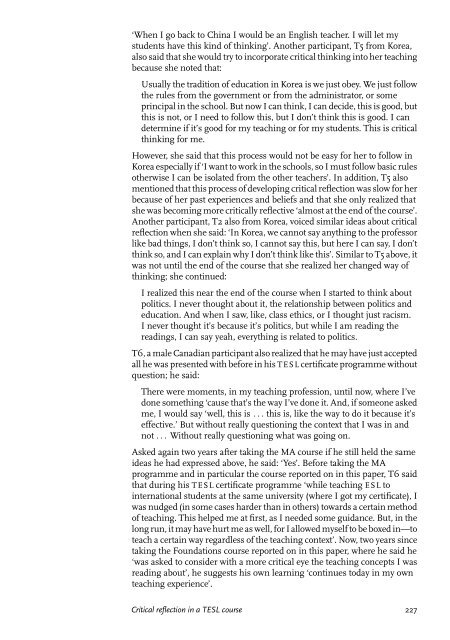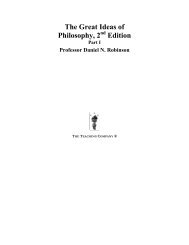Critical reflection in a TESL course: mapping conceptual change
Critical reflection in a TESL course: mapping conceptual change
Critical reflection in a TESL course: mapping conceptual change
Create successful ePaper yourself
Turn your PDF publications into a flip-book with our unique Google optimized e-Paper software.
‘When I go back to Ch<strong>in</strong>a I would be an English teacher. I will let my<br />
students have this k<strong>in</strong>d of th<strong>in</strong>k<strong>in</strong>g’. Another participant, T5 from Korea,<br />
also said that she would try to <strong>in</strong>corporate critical th<strong>in</strong>k<strong>in</strong>g <strong>in</strong>to her teach<strong>in</strong>g<br />
because she noted that:<br />
Usually the tradition of education <strong>in</strong> Korea is we just obey. We just follow<br />
the rules from the government or from the adm<strong>in</strong>istrator, or some<br />
pr<strong>in</strong>cipal <strong>in</strong> the school. But now I can th<strong>in</strong>k, I can decide, this is good, but<br />
this is not, or I need to follow this, but I don’t th<strong>in</strong>k this is good. I can<br />
determ<strong>in</strong>e if it’s good for my teach<strong>in</strong>g or for my students. This is critical<br />
th<strong>in</strong>k<strong>in</strong>g for me.<br />
However, she said that this process would not be easy for her to follow <strong>in</strong><br />
Korea especially if ‘I want to work <strong>in</strong> the schools, so I must follow basic rules<br />
otherwise I can be isolated from the other teachers’. In addition, T5 also<br />
mentioned that this process of develop<strong>in</strong>g critical <strong>reflection</strong> was slow for her<br />
because of her past experiences and beliefs and that she only realized that<br />
she was becom<strong>in</strong>g more critically reflective ‘almost at the end of the <strong>course</strong>’.<br />
Another participant, T2 also from Korea, voiced similar ideas about critical<br />
<strong>reflection</strong> when she said: ‘In Korea, we cannot say anyth<strong>in</strong>g to the professor<br />
like bad th<strong>in</strong>gs, I don’t th<strong>in</strong>k so, I cannot say this, but here I can say, I don’t<br />
th<strong>in</strong>k so, and I can expla<strong>in</strong> why I don’t th<strong>in</strong>k like this’. Similar to T5 above, it<br />
was not until the end of the <strong>course</strong> that she realized her <strong>change</strong>d way of<br />
th<strong>in</strong>k<strong>in</strong>g; she cont<strong>in</strong>ued:<br />
I realized this near the end of the <strong>course</strong> when I started to th<strong>in</strong>k about<br />
politics. I never thought about it, the relationship between politics and<br />
education. And when I saw, like, class ethics, or I thought just racism.<br />
I never thought it’s because it’s politics, but while I am read<strong>in</strong>g the<br />
read<strong>in</strong>gs, I can say yeah, everyth<strong>in</strong>g is related to politics.<br />
T6, a male Canadian participant also realized that he may have just accepted<br />
all he was presented with before <strong>in</strong> his <strong>TESL</strong>certificate programme without<br />
question; he said:<br />
There were moments, <strong>in</strong> my teach<strong>in</strong>g profession, until now, where I’ve<br />
done someth<strong>in</strong>g ‘cause that’s the way I’ve done it. And, if someone asked<br />
me, I would say ‘well, this is ...this is, like the way to do it because it’s<br />
effective.’ But without really question<strong>in</strong>g the context that I was <strong>in</strong> and<br />
not ... Without really question<strong>in</strong>g what was go<strong>in</strong>g on.<br />
Asked aga<strong>in</strong> two years after tak<strong>in</strong>g the MA <strong>course</strong> if he still held the same<br />
ideas he had expressed above, he said: ‘Yes’. Before tak<strong>in</strong>g the MA<br />
programme and <strong>in</strong> particular the <strong>course</strong> reported on <strong>in</strong> this paper, T6 said<br />
that dur<strong>in</strong>g his <strong>TESL</strong> certificate programme ‘while teach<strong>in</strong>g ESL to<br />
<strong>in</strong>ternational students at the same university (where I got my certificate), I<br />
was nudged (<strong>in</strong> some cases harder than <strong>in</strong> others) towards a certa<strong>in</strong> method<br />
of teach<strong>in</strong>g. This helped me at first, as I needed some guidance. But, <strong>in</strong> the<br />
long run, it may have hurt me as well, for I allowed myself to be boxed <strong>in</strong>—to<br />
teach a certa<strong>in</strong> way regardless of the teach<strong>in</strong>g context’. Now, two years s<strong>in</strong>ce<br />
tak<strong>in</strong>g the Foundations <strong>course</strong> reported on <strong>in</strong> this paper, where he said he<br />
‘was asked to consider with a more critical eye the teach<strong>in</strong>g concepts I was<br />
read<strong>in</strong>g about’, he suggests his own learn<strong>in</strong>g ‘cont<strong>in</strong>ues today <strong>in</strong> my own<br />
teach<strong>in</strong>g experience’.<br />
<strong>Critical</strong> <strong>reflection</strong> <strong>in</strong> a <strong>TESL</strong> <strong>course</strong> 227














